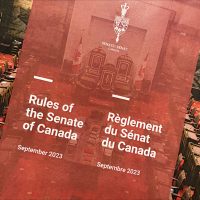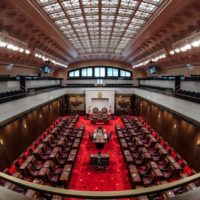Senate Renewal
Let’s adopt a sober second thought checklist: Senator Bellemare
Senator Diane Bellemare wants to amend the Rules of the Senate to require committees to include specific details in their reports.
Senate committees should use a standard checklist when drafting reports on bills to ensure sober second thought follows a “transparent, comprehensible and non-partisan methodology,” the Legislative Deputy to the Government Representative has proposed.
Senator Diane Bellemare has argued in favour of amending the Rules of the Senate to require committees to include specific details in their reports to help guide debate at third reading.
“This approach will allow Senators to debate more specific aspects of the legislation being examined rather than just indicating whether they are for or against a bill,” she said in a speech to the Senate.
The checklist would include whether the proposed legislation:
- conforms with the Constitution of Canada, including the Canadian Charter of Rights and Freedoms, and the division of legislative powers between Parliament and the provincial and territorial legislatures;
- conforms with treaties and international agreements that Canada has signed or ratified;
- unduly impinges on any minority or economically disadvantaged groups;
- has any impact on one or more provinces or territories;
- has undergone the appropriate consultations;
- and contains any obvious drafting errors, including consistency between French and English versions.
Senator Bellemare also endorsed an amendment by former Senator Nancy Ruth, which would add gender-based analysis to the checklist.
Under the proposed changes, committee reports would also include details about all amendments moved but not adopted in the committee, as well as any other matter the committee decides should be brought to the Senate’s attention.
Currently, the Rules of the Senate only require a committee to provide observations or explanations when it amends or rejects legislation (with the exception of the budget implementation bill).
Senator Bellemare argued that while the Senate has vast constitutional powers, Senators must use those powers responsibly because they are not elected.
“We have a duty to improve legislation … when it seems appropriate but we cannot legitimately oppose a bill passed by the House of Commons just because we don’t like it,” she said, emphasizing the role of the Senate as a complementary chamber that should not repeat the same ideological debates as the elected house.
The Senate has been considering Senator Bellemare’s proposal since May 2016.





















































